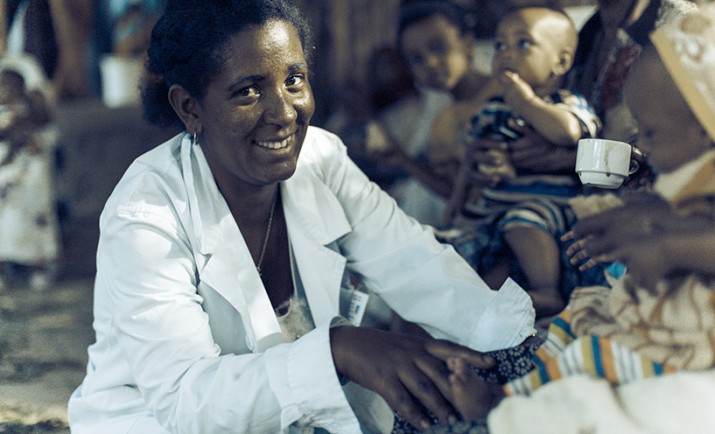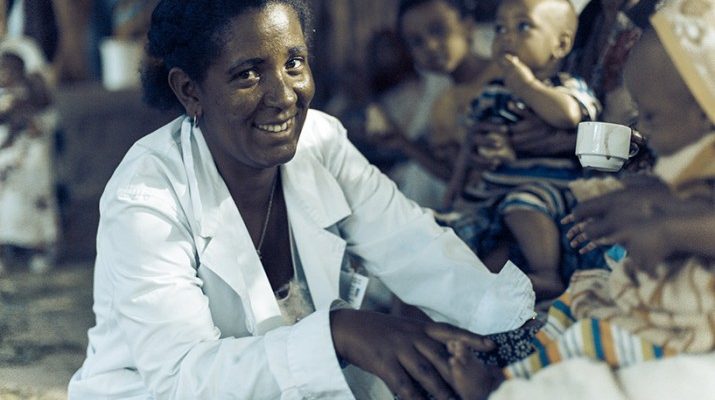The LMG project is working in partnership with the new Gender Directorate within the Federal Ministry of Health (FMOH) to help ensure that gender equity is practiced at all levels of the health system in Ethiopia.
The Gender Directorate’s mandate is to ensure that gender is mainstreamed throughout the ministry of health in Ethiopia. This is a very difficult and important mandate. Building our capacity is the first step to fulfill this responsibility. We must plan, design, advocate, implement and monitor interventions to mainstream gender, and this requires leadership, knowledge, awareness, and skills.

The Leadership, Management & Governance (LMG) project has contributed significantly to helping us fulfill this mandate by building our capacity in various ways. One of the reasons for the success we have had working with LMG is that they were able to align the technical assistance they provided with our needs and priorities. We have shared our priorities before the program started, and we are happy to report that so far, we are on target with our collaboration.
– Mrs.Yamerot Andualem, Director of Gender Directorate
In Ethiopia, gender equality is an important goal, and all development sectors—from agriculture to education to health—require gender mainstreaming[1] to move development activities forward.
In addition, gender oppression not only affects women and girls but also affects men and boys since it undermines the wellbeing of families, households, communities, and the nation at large. Gender is not just “women’s business,” or “Yesotoch Goudaye” (which translates literally as “gender” in Amharic)—it is everyone’s business.
The Ethiopian Federal Ministry of Health (FMOH) recognizes that gender plays a prominent role in determining health and disease patterns. The health system’s response to different challenges is also important in determining health outcomes. The FMOH has identified clear objectives to ensure that gender is mainstreamed in all directorates and at all levels of the health system. In the past, the FMOHassigned a gender focal point who was responsible for all activities related to gender issues. However, given the importance of this topic, the Ministry has now established an autonomous Gender Directorate, which reports directly to the Minister of Health.
As a relatively new directorate, the Gender Directorate faces many challenges in mainstreaming gender within the larger Ministry. Some of these challenges include minimal staffing as well as a lack of tools, methodologies, and plans to effectively advocate for the integration of gender into all of the FMOH departments. To overcome these challenges, the Gender Directorate asked the LMG project to provide technical assistance to build the capacity of the directorate, and to help close these gaps.
Within the Directorate, LMG works alongside FMOH staff to strengthen the activities of the existing technical working group on gender and health, and to build capacity through training and onsite technical support. Says Seble Daniel, LMG staff member embedded within the Directorate: “My role as the gender advisor is not to do the work of the Gender Directorate, but to work in collaboration with them to build their capacity. They want gender institutionalized in the work of the Ministry, and they are interested in building long-term capacity at the federal and regional level to implement this.”
One of the objectives of the Directorate is to find a way to mainstream gender into all Ministry activities. The FMOH felt that it was critical for health care providers to receive training on gender awareness, and gain a better understanding of how gender mainstreaming enhances both health care outcomes and health service responses. To meet this critical need, LMG project staff have worked in collaboration with FMOH colleagues to draft a gender mainstreaming training manual that will be used in training FMOH staff at the federal and regional levels. In addition to raising awareness around gender issues, the manual gives good, practical information on: national legislation and policies related to gender; tools and methodologies used in conducting a gender analysis, and a gender audit; the different stages of gender mainstreaming; creating a budget that is planned, approved, executed, monitored, and audited in a gender-sensitive way.
In order to enrich this training manual, the Gender Directorate and the LMG project organized a two-day consultative workshop for 32 professionals (19 women and 13 men) within the FMOH with gender expertise drawn from FMOH, public sector hospitals, United Nation organizations, NGOs, and relevant ministries. The participants examined both the content and methodology of the manual, and their comments and feedback will be incorporated into the final manual.
LMG also facilitated a strategic planning retreat for the Gender Directorate in April 2013 to help plan the gender training, including a SWOT analysis (Strengths, Weakness, Opportunities, and Threats)[2] around implementation of the plan. The strategic plan is expected to be finalized and disseminated widely in September 2013. Following approval by the FMOH, the manual is expected to become the standard gender mainstreaming manual for health managers throughout the country.
The implementation of training of FMOH staff in gender awareness and gender mainstreaming represents a major milestone for the new Gender Directorate in planning concrete activities that will help raise awareness of gender issues among FMOH staff, and integrate gender mainstreaming into all FMOH activities. In addition, since standardization of national training is a priority of the Human Resources and Training Directorates of the FMOH, the development, approval, and standardized use of the manual as part of FMOH staff training will be a major contribution of the LMG project in helping the FMOH achieve this goal.
[1] The United Nations Economic and Social Council (ECOSOC) defined the concept of gender mainstreaming as follows: “Mainstreaming a gender perspective is the process of assessing the implications for women and men of any planned action, including legislation, policies or programmes, in any area and at all levels. It is a strategy for making the concerns and experiences of women as well as of men an integral part of the design, implementation, monitoring and evaluation of policies and programmes in all political, economic and societal spheres, so that women and men benefit equally, and inequality is not perpetuated. The ultimate goal of mainstreaming is to achieve gender equality.” http://www.ilo.org/public/english/bureau/gender/newsite2002/about/defin.htm.
[2] A SWOT analysis refers to a planning method used to evaluate the Strengths, Weaknesses, Opportunities, and Threats involved in a project or any kind of venture. A SWOT analysis can be carried out related to a place, an industry, a person, or a process. It involves defining an objective and then identifying the internal and external factors that are favorable and unfavorable to achieving that objective.
Photos courtesy of: Belkis Giorgis

